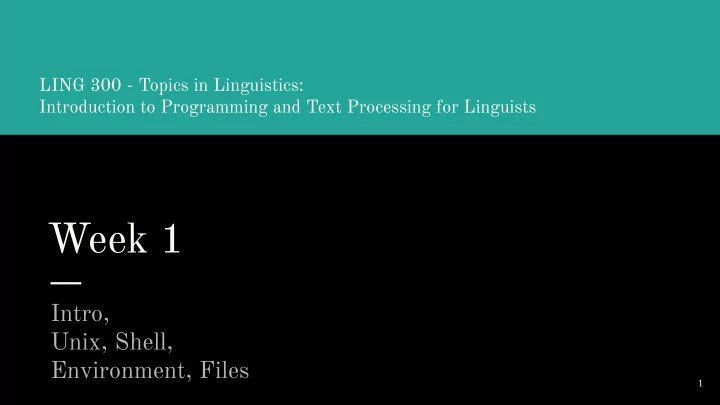

LING 300 - Topics in Linguistics: Introduction to Programming and Text Processing for Linguists Week 1 Intro, Unix, Shell, Environment, Files 1
Who is this class for? ● Linguists, social scientists, humanists ● Little-to-no programming experience ● Applications to research Goals ● Lots of hands-on practice ● Teach you how to teach yourself 2
Who is this class not for? ● Folks with lots of programming experience ● CS Majors (probably - email me if this is you) ● COMP_SCI 110 is similar in focus (and uses one of the same textbooks) - what’s different? ○ CS110 - broad, more CS-y (e.g. debugging and testing) ○ LING300 - narrow focus on applications to text, we will purposefully skip less-relevant stuff 3
What will we learn? ● Unix Command Line basic usage, remote access, and tools for text ● Basic Python programming concepts, syntax, useful libraries for text ● Applications (as much as we have time) web scraping, APIs, data munging, text analysis 4
When and where will we see each other? Zoom at normal class times (optional but recommended) short lecture (likely usually only for Monday class) recorded if you can’t make it Office hours - Monday 5-6pm, Tuesday noon-1pm hangout room, with breakout for individual questions Piazza discussion board for questions help each other out! 5
Why are we doing this? 1. Get computationally “free” - GUIs only let you do things someone else decided on 2. Processing text data is useful for anyone’s research 3. This is the start of computational linguistics! web search, speech-to-text, conversational AI, “big data” language analysis, etc etc 6
How will we do it? Syllabus on course website: http://faculty.wcas.northwestern.edu/robvoigt/ling300/ Assignments, peer review, final project Videos/readings before class, working on assignments during Graded on effortful completion, self-evaluation (Universal pass/fail this quarter!) 7
The Struggle! Learning programming is like learning a new language You have to soak in it and use it daily It will feel unnatural at first, push through Don’t be afraid to play around and break stuff 8
The Struggle Illustrated 9
YOU CAN ERRORS DO ARE IT YOUR NEW FRIENDS No such thing as a dumb question here. 10
Our new home: the command line 11
Precision - the challenge of exactitude One wrong letter, space, or punctuation mark can easily derail you These mistakes are at first very hard to see Double-check, triple-check your code and relevant documentation Take a break and come back to it 12
Benefits of command line interfaces Automatable Fast easy to do GUI interfaces are something 1000x computationally ‘heavy’ Consistent Transparent same command always you’ll learn what your files does the same thing actually are 13
An abstraction! What is a file? … but ultimately, an array of bytes e.g., for ASCII text: Character L I N G Bits 100 1100 100 1001 100 1110 100 0111 14
Types of Files Text bytes representing characters file txt, code (like .py), html, logs extensions are just a Executable helpful compiled code in binary format suggestion! to run as a program Data everything else: images, zip files, doc/ppt/pdf, and so on 15
Quest! Original plan was to use Quest exclusively Remote computing environment, cluster of computers running Linux If it is slow because of where you are, you can do Common for “big data” and everything locally, then high-performance tasks upload assignments Can schedule complex stuff, not waste your own machine scp assignment.txt [netid]@quest.it.northwestern.edu:/projects/e31086/user/[netid]/week1/ 16
Recommend
More recommend